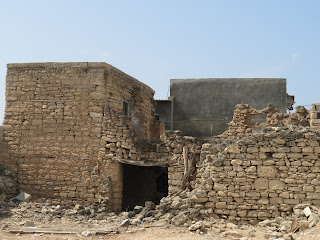Day 99 Sat Apr 22, 2023 Salalah, Oman 8-4:00 Maybe get on public bus at port and ride the loop.
Random collection of notes from my guide on Arabian Heritage Tour. Today is Eid and most businesses. museums, stores, etc. are closed. We rode through three towns. The Sultan’s father made many changes in Oman when he was in charge from 1970 to 2020. Ladies were allowed to go outside without a male family member escorting them. Woman were given rights.
My guide wears black when she is with her family. Their dresses are made of cotton. The 50 year sultan allowed women to wear other colors and his wife showed her hair. There are no rules for women to follow in a passport picture, but men must wear a white distache/dress and a turban.
Oman’s income comes from oil, natural gas, tourism,and frankincense. The grandfather kept the oil money for himself and his family. The grandfather put his son in jail. When the son returned from studying abroad, he had many ideas for changes. Many people supported the son’s ideas and the son took the power from his father. The father became sick and the son sent him abroad for treatment.
The son built a hospital and school and health care became free. Children go to school from ages 6 to 18. Girls are taught by women and boys are taught by men. Boys and girls can be in mixed classes at the university. At this time there are not enough teachers or doctors. Teachers are comiing from India and Pakistan. University is free and students receive a salary while attending. The prison is next to the Sultan’s farm and provide him labor. The government provides housing for those in need. The people pay for electricity and water.
Males and females cannot mix. In each house, there is a women’s sitting room and a men’s sitting room. There is mixing of men and women in the family quarters. In 1970, women were allowed to choose a husband. Prior to that, marriages were arranged and that still happens in some houses. Men can marry up to four wives and all must be treated equally. It will cost the man $12,000 per wife. Women will celebrate the coming marriage at a five-star hotel and men will celebrate at an outdoor camp. In families, women often only help the first wife. If a couple divorces, the woman goes back to her family.
The people of Oman do not go swimming. They do go fishing.
When someone passes, they are buried very quickly The body goes to the mosque and is washed. They are buried with the right hand down and facing Mecca.
We saw camels along the road and actually saw a group of camels running down the road. Camels roam free in Salalah, but do not roam in Muscat. There is no riding of camels in this part of Oman. People use the meat, milk and leather of camels. The meat must be cooked for a long time.
There is no rain in Oman nine months of the year. June to August is the monsoon season. Weather comes from the Indian Ocean. They use water from the Indian Ocean in their houses and buy water to drink.
Villages are often close to the sea because fishing is a source of income. Houses can have 3 to four generations. The guides house had 14 children. There were four girls and nine boys and my guide was the youngest. Boys remain in the family home as they marry and the children are raised together. When a girl marries, she moves to her husband’s house.
Oman fought Yemen and Iran for the Salalah area. The 50-year Sultan then married two local girls to help gain control of the area. The Palace is huge and provides housing for many.
Arabian Heritage (SLL-001)
April 22, 2023
Port: Salalah
Tour Length: Half-Day (Approximately 4 hours)
Tour Description
Wonder at the disparity between Salalah’s dense vegetation and the arid landscapes beyond.
Look for the unique silhouettes of camels on your coach drive through the desert.
Admire the fishing village of Taqa’s commanding fort and homes built with white stones that resist heat.
Discover the remains of Sumhuram, a long-gone settlement included in the Land of Frankincense UNESCO World Heritage site.
Study the twin domes and beguiling Islamic architecture of the Prophet Mohammed Bin Ali’s tomb.
(I did not do much of this.) Experience the scenic beauty, diverse terrain and ancient history of the region surrounding Salalah during this orientation tour, which includes the Land of Frankincense, a UNESCO World Heritage site. As you journey through Salalah, you’ll notice the contrast between the city’s monsoon-fed lush vegetation and the adjacent desert landscape, where you’re likely to see roaming camels. In the ancient fishing village of Taqa, visit a fascinating fort and view traditional houses where the local fishermen dwell. Observe how the buildings are constructed with elegant white stones, which are sourced nearby for their heat-resistant quality. Continue to Khor Rori creek, site of the ruins of the age-old city of Sumhuram, once the capital of Arabia’s exotic frankincense trade and now part of the Land of Frankincense UNESCO World Heritage site. Gaze at excavations that reveal evidence of a centuries-old city with trade links to settlements in the Far East and even distant Greece. Enjoy a photo stop at the Prophet Mohammed Bin Ali’s tomb, whose architecture and especially its twin domes are fine examples of medieval Islamic architecture, another compelling example of the deep historic heritage found in this nearly untouched corner of the world.
HELPFUL HINTS
Wear casual, conservative, weather-appropriate clothing and comfortable walking shoes.
Due to Muslim traditions, shorts, beachwear or sleeveless shirts are not appropriate.
Bring a hat, sunglasses and sunscreen.
PLEASE NOTE
This tour includes approximately one hour of moderate walking/standing
I found the old doors interesting. Notice there is a small door inside the larger door.














No comments:
Post a Comment